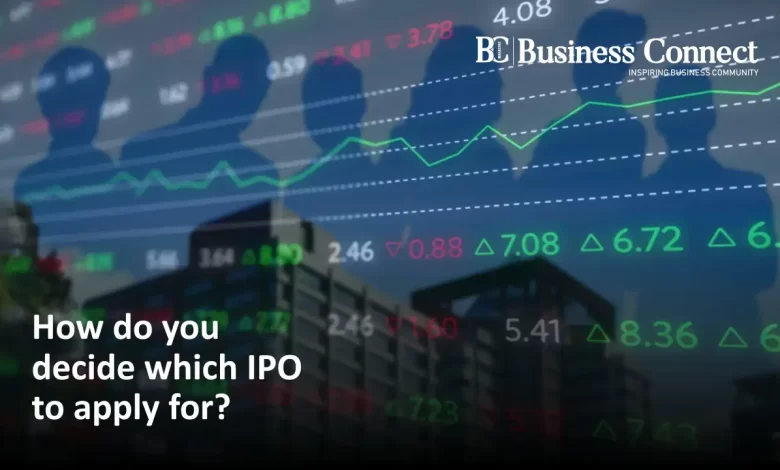How Do You Decide Which IPO To Apply For| Business Connect

How do you decide which IPO to apply for?
An initial public offering or IPO is a significant milestone for a company as it transitions from a private entity to a publicly traded one by offering its shares to the public for the first time. Participating in an IPO offers investors a chance to invest in a company at the start of its journey in the public market.
This early entry can lead to significant benefits if the company experiences strong growth and success over time. However, the process of selecting the right IPO to apply for is complex and requires a thorough evaluation of several critical factors. In this article, we will discuss the key considerations investors should assess when deciding which IPO to apply for.
How to choose the right IPO?
Choosing the right IPO involves assessing key factors such as the company’s financial health and growth potential while also considering recent offerings, including those with the status ‘IPO closed today’. By understanding these elements, investors can make informed decisions that align with their financial goals. This guide will walk you through the essential steps to evaluate before applying for an IPO.
Understanding the company’s business model
Before applying for an IPO, it is crucial to understand the company’s business model. This involves analysing how the company makes money, its core products or services, and its target market. A well-established and scalable business model often indicates the potential for future growth, making the IPO more attractive to investors.
Evaluating the company’s financial health
Another critical step is assessing the company’s financial health. Investors should review the company’s financial statements, including its revenue, profit margins, and debt levels. A company with strong revenue growth, healthy profit margins, and manageable debt is generally considered a better candidate for investment.
Management team and track record
When evaluating an IPO, it is important to research the experience and track record of the company’s leadership. A strong management team with a history of successfully growing businesses can instil confidence in investors. On the other hand, a lack of experience or a history of poor decision-making may raise red flags.
Industry and market conditions
The industry in which the company operates and the current market conditions are also important factors to consider. Some industries may be more favourable for investment due to high growth potential, while others may be more volatile or subject to regulatory changes. For example, technology companies often operate in rapidly evolving markets, which can offer substantial growth opportunities.
Valuation and pricing of the IPO
The IPO price is often determined by the company’s valuation, which is based on factors such as revenue, profit margins, and growth prospects. Investors should compare the IPO price with the company’s valuation to determine if the shares are reasonably priced. If the IPO price is too high relative to the company’s valuation, it may indicate that the shares are overvalued, which could lead to lower returns for investors.
Analyst reports and investor sentiment
Analyst reports and investor sentiment can provide additional insights into an IPO. Analysts often conduct in-depth research on companies planning to go public and publish reports with their recommendations. These reports can highlight potential risks and opportunities associated with the IPO.
Additionally, gauging investor sentiment through forums, social media, and financial news outlets can provide a sense of the market’s perception of the IPO.
Understanding the IPO timeline
Investors should be aware of the IPO timeline, including key dates such as the IPO open and close dates, the basis of allotment date, the initiation of refunds date, and the listing date. Knowing the IPO timeline helps investors plan their investments and ensures they do not miss important deadlines.
It is also important to note that some IPOs may close earlier than expected if they are oversubscribed. Therefore, keeping track of the IPO timeline is essential for investors looking to participate in the offering.
Assessing risk factors
Every investment comes with risks, and IPOs are no exception. Before applying for an IPO, investors should thoroughly assess the risk factors associated with the company and its industry. Common risk factors include regulatory challenges, market volatility, and competition. Additionally, the company’s ability to adapt to changing market conditions and maintain its competitive edge are important considerations.
Long-term potential vs. short-term gains
Investors should also consider whether they are looking for long-term potential or short-term gains when deciding which IPO to apply for. Some investors may be attracted to the potential for quick profits on the listing day, while others may be more interested in holding the shares for the long term.
Make the Right IPO Investment Decision
Investing in an IPO can be an exciting and potentially profitable experience, but it requires careful thought and planning. To make smart decisions, it’s important to understand how to evaluate the company’s business model, financial health, management team, industry conditions, and the details of the IPO.
Additionally, partnering with a trusted platform like Ventura can significantly improve your investment journey. It’s one of India’s leading trading and brokerage platforms, offering the tools and expertise needed to navigate the complexities of IPO investments and the stock market.






